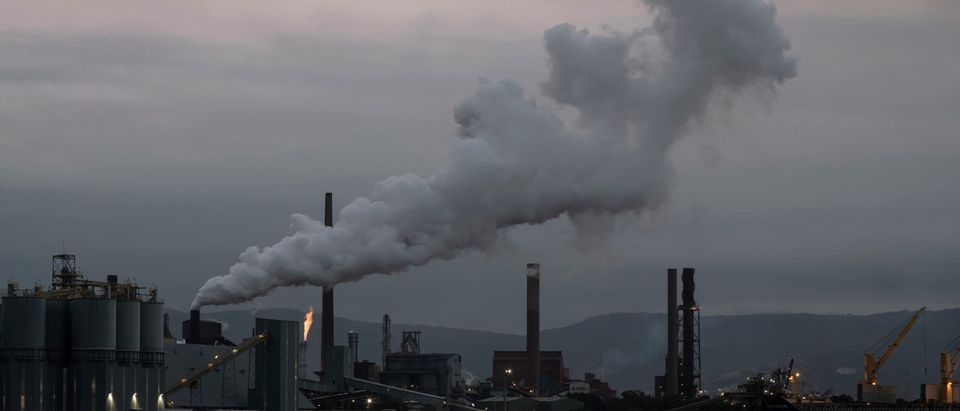- An unreleased rule from President Joe Biden’s Environmental Protection Agency (EPA) is widely expected to push fossil fuel-fired power plants to implement carbon capture, an “expensive and difficult” technology that will likely force many coal plants to shut down, industry experts told the Daily Caller News Foundation.
- Carbon capture processes typically take carbon dioxide from power facilities, compress it, and then ship it off to deep underground storage sites or for commercial use, according to the International Energy Agency.
- “It’s pointless as well as expensive,” Myron Ebell, director of the Center for Energy and Environment at the Competitive Enterprise Institute, told the DCNF. “We’d be better off burying our increasingly worthless paper currency in holes in the ground.”
An unreleased rule from President Joe Biden’s Environmental Protection Agency (EPA) is widely expected to push fossil fuel-fired power plants to implement carbon capture, an “expensive and difficult” technology that will likely force many coal plants to shut down, industry experts told the Daily Caller News Foundation.
The rule will strictly limit power plant emissions, effectively requiring widespread deployment of carbon capture technology for coal-fired power plants to remain compliant, according to Politico, citing two sources familiar with the matter. If the finalized proposal — expected to be issued for review later this week — takes effect, it could lead to “more premature coal retirements,” Michelle Bloodworth, president and CEO of national coal advocacy group, America’s Power, told the Daily Caller News Foundation. (RELATED: After Pushing To Shut Coal Plants Down, Biden Shells Out Millions For Green Projects In Coal Towns)
“At a time when the Biden Administration is rushing to electrify the economy and pushing for more electric vehicles, we need more, not fewer, dependable electricity sources,” said Bloodworth. “The Administration’s goal to shut down coal plants is in stark contrast to the agenda of China and other countries who are increasing their reliance on coal to build up their economies.”
Carbon capture, utilization and storage (CCUS) processes capture carbon dioxide from power facilities, which is then typically compressed and stored deep underground or shipped for commercial use, according to the International Energy Agency. While the EPA rule is not expected to explicitly mandate the use of carbon capture, strict emissions limits could act as a “de facto mandate” for fossil fuel-fired power plants to implement the technology, Axios reported.
A recent EPA proposal to reduce tailpipe emissions similarly fell short of banning the sale of gas-powered vehicles outright, but the agency projects that the strict standards will result in two-thirds of all new vehicle sales made after 2032 will be electric vehicles.
“EPA cannot comment [on the proposals] because the proposals are under interagency review and subject to change,” the agency said in a statement to the DCNF. “But we have been clear from the start that we will use all of our legally-upheld tools, grounded in decades-old bipartisan laws, to address dangerous air pollution and protect the air our children breathe today and for generations to come.”
“Carbon capture remains extremely expensive and difficult to retrofit or include in new plants,” Kenny Stein, director of policy at the Institute for Energy Research, told the DCNF. “In particular, no carbon capture project has managed to make money on its own terms.”
Today on #EarthDay, hear from engineer and SVP at CarbonQuest, Doug Staker, who gives a tour of this first-of-its-kind carbon-capture system. #InvestInOurPlanet pic.twitter.com/7wHHH8Y6N0
— ASME.org (@ASMEdotorg) April 22, 2023
Carbon capture projects have struggled to be economically viable because there is little economic incentive to capture the carbon for commercial uses, according to Stein. He noted that carbonated beverages, for example, typically require a more pure product than what’s captured from power plants, which he believes is “destined for underground storage.”
Stein went on to say that it was “hard to predict the future” and an innovation could change the cost-effectiveness of the technology, but such technology is “many years” away.
Even if the technology could be made viable, it would likely result in higher costs for consumers, since the equipment to capture carbon dioxide requires a significant amount of energy, Myron Ebell, director of the Center for Energy and Environment at the Competitive Enterprise Institute, told the DCNF. Even if the costs are reduced, it would only be economically viable if it was less expensive than competing wind and solar projects, which he anticipates will also be a “higher priced” alternative to current energy sources.
“It’s pointless as well as expensive,” Ebell quipped. “We’d be better off burying our increasingly worthless paper currency in holes in the ground.”
Some environmentalists have criticized carbon capture for being too expensive and diverting funding from renewable energy sources. However, some environmentalist groups, such as the Natural Resources Defense Council (NRDC) and Evergreen Action, have publicly supported the technology, which they believe could help cut as much as 90% of all emissions from power plants, according to Politico.
“We’ve been encouraged by what we’ve heard from EPA,” Lissa Lynch, director of the NRDC Federal Legal Group, told Politico. “I recognize that it is absolutely a difficult needle to thread.”
The Biden administration has set a target of a net zero economy by 2050, and the president’s signature climate law, the Inflation Reduction Act (IRA), will reportedly push between 30 to 60 gigawatts worth of coal-fired power offline by 2030. The White House recently announced $450 million in funding to support green energy projects for “historic coal and mining communities” to host the transition to green energy sources.
All content created by the Daily Caller News Foundation, an independent and nonpartisan newswire service, is available without charge to any legitimate news publisher that can provide a large audience. All republished articles must include our logo, our reporter’s byline and their DCNF affiliation. For any questions about our guidelines or partnering with us, please contact licensing@dailycallernewsfoundation.org.


